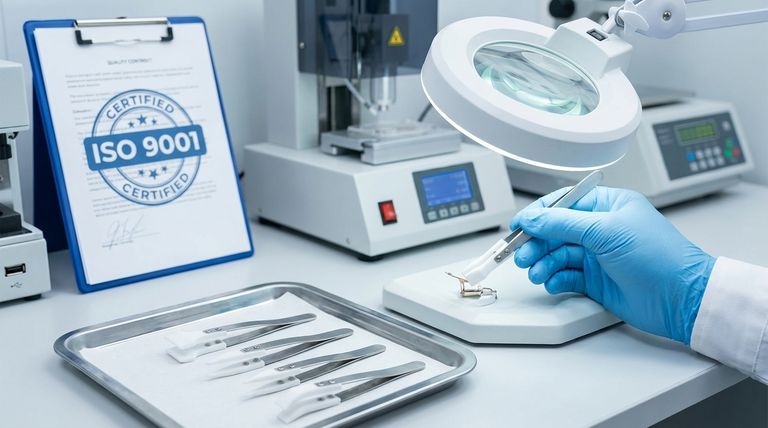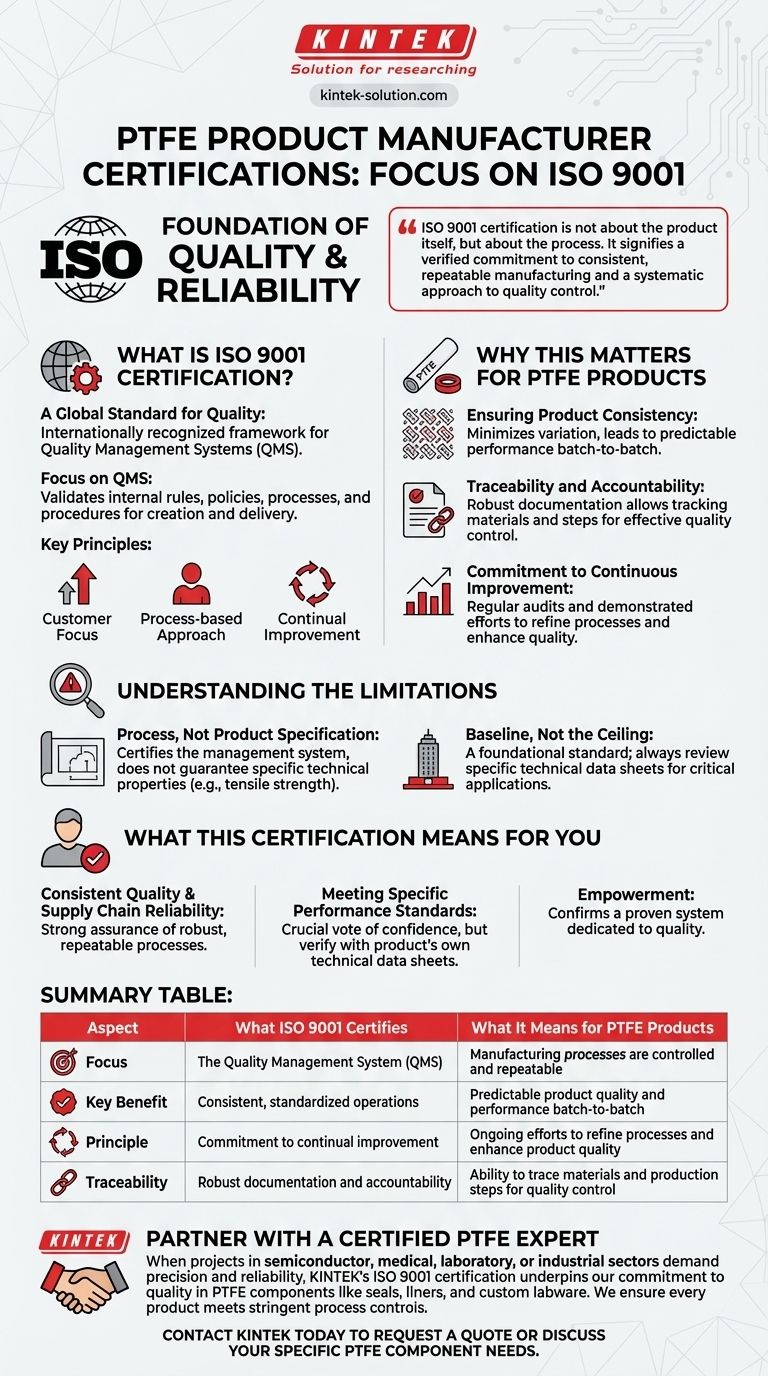To ensure a foundation of quality and reliability, the manufacturer of these PTFE products holds the internationally recognized ISO 9001 certification. This certification confirms that their operations adhere to a rigorous and standardized Quality Management System (QMS).
ISO 9001 certification is not about the product itself, but about the process. It signifies a verified commitment to consistent, repeatable manufacturing and a systematic approach to quality control, which directly translates to a more reliable end product for you.

What is ISO 9001 Certification?
ISO 9001 is the global benchmark for Quality Management Systems. It provides a framework that organizations use to ensure their products and services consistently meet customer and regulatory requirements.
A Global Standard for Quality
This is an internationally agreed-upon standard that sets out the criteria for a quality management system. It can be used by any organization, large or small, regardless of its field of activity.
The Focus on a Quality Management System (QMS)
At its core, the certification validates the manufacturer's QMS. This is the set of internal rules, policies, processes, and procedures that govern how the company creates and delivers its products.
Key Principles of ISO 9001
The standard is based on several quality management principles, including a strong customer focus, a clear process-based approach, and a commitment to continual improvement. This ensures the entire organization is aligned on delivering quality.
Why This Matters for PTFE Products
For a technical material like PTFE, where performance characteristics are critical, a certified manufacturing process provides essential assurances.
Ensuring Product Consistency
An ISO 9001 certified system ensures that every batch of PTFE products is created using the same documented, controlled, and repeatable processes. This minimizes variation and leads to highly predictable product performance.
Traceability and Accountability
The standard requires robust documentation. This means the manufacturer can trace materials and production steps, which is vital for effective quality control and for quickly addressing any issues should they arise.
A Commitment to Continuous Improvement
Certification isn't a one-time event. It requires regular audits and a demonstrated commitment to refining processes, reducing waste, and enhancing product quality over time.
Understanding the Limitations
Objectivity requires acknowledging what a certification does and does not guarantee. Understanding its scope is key to making an informed decision.
It's About Process, Not Product Specification
ISO 9001 certifies the management system, not the final product. It ensures the process to achieve a specification is controlled, but it does not in itself guarantee a PTFE rod has a specific tensile strength or dielectric constant.
Certification is a Baseline, Not the Ceiling
While ISO 9001 is a powerful indicator of a reliable partner, it is a foundational standard. For highly critical applications, you should always review the product’s specific technical data sheets and performance specifications.
What This Certification Means for You
Use this information to align the manufacturer's qualifications with your project's specific needs.
- If your primary focus is consistent quality and supply chain reliability: This certification provides strong assurance that the manufacturer has robust, repeatable processes in place to deliver a dependable product.
- If your primary focus is meeting a specific technical performance standard: View the ISO 9001 certification as a crucial vote of confidence in the manufacturer's capabilities, but always verify that the product's own technical data sheets meet your exact requirements.
Ultimately, this certification empowers you by confirming the manufacturer has a proven system dedicated to quality.
Summary Table:
| Aspect | What ISO 9001 Certifies | What It Means for PTFE Products |
|---|---|---|
| Focus | The Quality Management System (QMS) | The manufacturing processes are controlled and repeatable |
| Key Benefit | Consistent, standardized operations | Predictable product quality and performance batch-to-batch |
| Principle | Commitment to continual improvement | Ongoing efforts to refine processes and enhance product quality |
| Traceability | Robust documentation and accountability | Ability to trace materials and production steps for quality control |
Partner with a Certified PTFE Expert
When your projects in the semiconductor, medical, laboratory, or industrial sectors demand precision and reliability, the manufacturer's ISO 9001 certification is your foundation for confidence. At KINTEK, this certification underpins our commitment to quality in manufacturing PTFE components like seals, liners, and custom labware.
We ensure every product, from prototypes to high-volume orders, meets stringent process controls for consistent results. Let's discuss how our certified quality management system can bring reliability and precision to your application.
Contact KINTEK today to request a quote or discuss your specific PTFE component needs.
Visual Guide

Related Products
- Custom PTFE Parts Manufacturer for Teflon Parts and PTFE Tweezers
- Custom PTFE Parts Manufacturer for Teflon Containers and Components
- Custom PTFE Volumetric Flasks for Advanced Scientific and Industrial Use
- Custom PTFE Teflon Balls for Advanced Industrial Applications
- Customizable PTFE Rods for Advanced Industrial Applications
People Also Ask
- What are the main advantages of using NBR seat butterfly valves? A Cost-Effective Choice for Oil & Fuel Systems
- Why are fillers added to PTFE? Enhance Performance for Demanding Applications
- What is the temperature resistance of Teflon? Master Its Performance from -200°C to 260°C
- What are the main components of PTFE-based materials? A Guide to Engineered Composites
- What is the volume resistivity and power factor of PTFE? Discover the Ultimate Electrical Insulator
- What are the two main types of PTFE polymers? A Guide to Suspension vs. Dispersion PTFE
- What are some notable properties of PTFE? Discover the Extreme Performance of Teflon
- In which industries is PTFE/Teflon commonly used? Discover Its Critical Role in High-Performance Applications



















